The Turing Machine
Alan Turing is considered the "father of modern computer science", and did a lot for this field as well as the field of artificial intelligence during his short life. He also created the iconic "Turing test".

Interestingly, Alan Turing also enjoyed board games. When he wasn't cracking codes, he used to play Monopoly, which has been a big part of my board game journey as well.
Ad
Perhaps what most people don't know about Alan Turing is that he created his machine, the "Turing Machine", to crack secret codes in German messages during World War II. The movie "The Imitation Game" told his story in cinemas all around the world in 2014.

Today's review will be precisely about this famous machine, the "Turing Machine", which cracked secret codes! Are you ready to crack some codes too?
Game Info
Turing Machine is supposed to be played with 1 to 4 players, ages 12 and up, by designers Fabien Griedl and Yoann Levet. Its art was created by Sébastien Bizos.
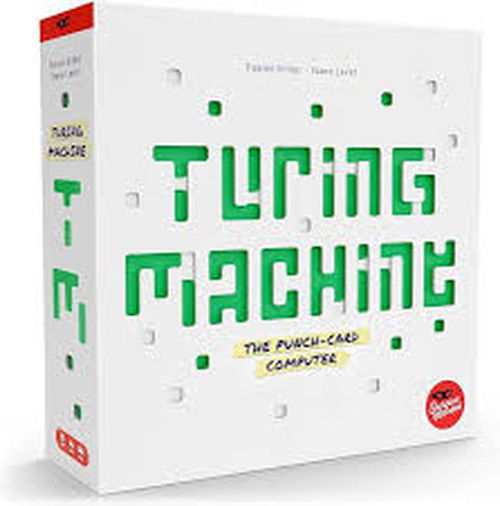
It was released by Le Scorpion Masqué in 2022. In other countries, like Brazil, it was released in 2023. Its basic mechanic, as expected, is deduction.
Ever since it was released, Turing Machine has been collecting prizes, such as the Golden Geek, in 2022, when it was named the "Best Solo Board Game", and the American Tabletop Awards, which named it the winner of the "Casual American Board Games" category.
Let's get to the game!
The Game
Turing Machine basically centers around logic and deduction, so you should invest some time to learn how the internal logic of the game works. I say that because I played lots and lots of this game, and it truly does make a difference. You'll don't feel as "lost" when you do that.
The game isn't actually too difficult, but you might take a long time to fully understand its logic, for instance.
Visually, it is a beautiful game. Its components bring us back to when "punch cards" were common, and this is one of the details that makes the entire game stand out. The components and their quality are incredible and really help you through the game - the player's aid, which "doubles as a shield", the note sheet, and the cards, they all help us understand the game's logic a bit more (as long as you go through the rules as thoroughly as you can).
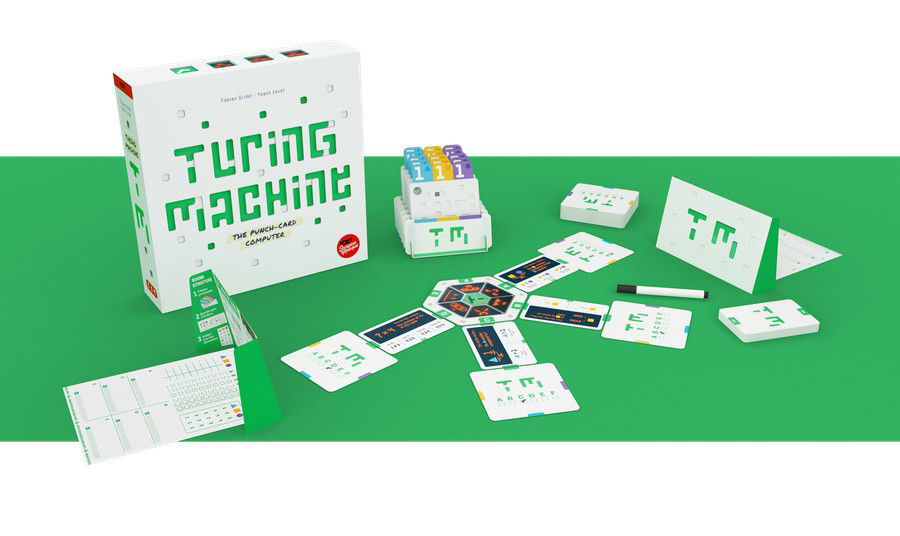
The goal is simple: be the first to crack the code that will pass the test of every Turing machine verifier. The code has 3 numbers, from 1 to 5. Each verifier will check a criterion according to the problem in question.
When you deduce all the criteria, you'll have a single code that satisfies all the conditions. Whoever does this first, wins the game.
The game is relatively simple from the moment you set up and choose a problem, which are all different in terms of difficulty and luck. Then, based on that, you should give each verifier their criteria cards.
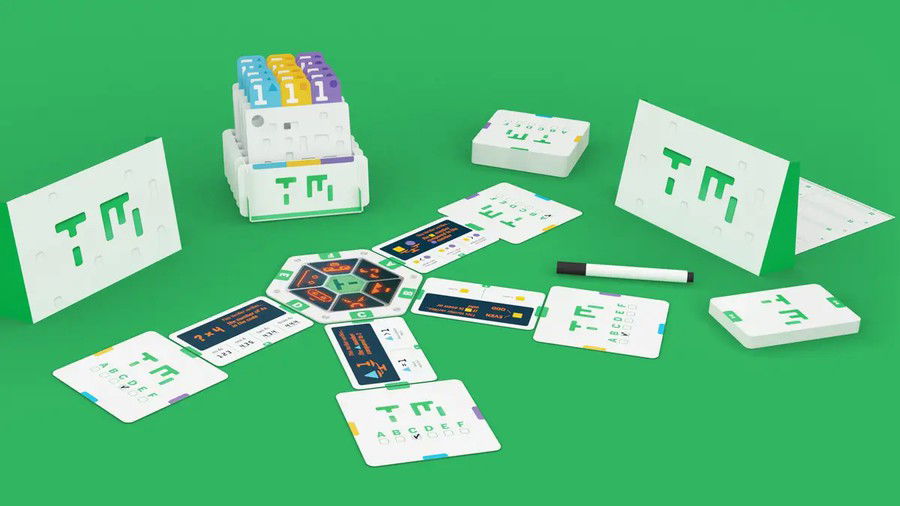
The box comes with 20 problems, but on the Turing Machine website, you'll find literally millions of others. You can pick them according to their difficulty, whether you're playing solo or coop, and much more. Every day, they pick a new challenge to highlight, but you can also create a challenge yourself and print it out with the material on the website, which is really useful. Oh, and there are other language options too.
Ad
After picking a problem, the next step is to make a proposal with 3 numbers (from 1 to 5 for each of the 3 numbers on the code, so you may choose 111 if you want) and move on to question the Turing machine. This means questioning every verifier and then testing their answers on the punch cards to see what the machine says.
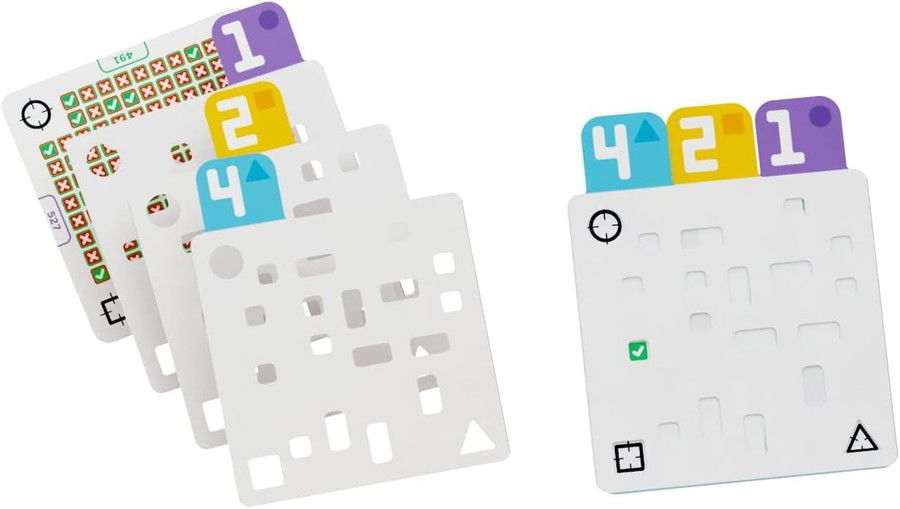
This is a great feature in the game because notice that in the picture above the sequence of 3 numbers is also represented respectively by triangle (blue), square (orange), and circle (purple). Like so, it is quite inclusive because you'll have the symbols to help you play the game without the colors if you experience any eyesight issues or are colorblind, for instance.
Each verifier will then check if your proposal meets the conditions on their criteria cards by aligning it with them, which usually have 2 or 3 possible answers. Then, it's up to you to deduce the rest of the code.
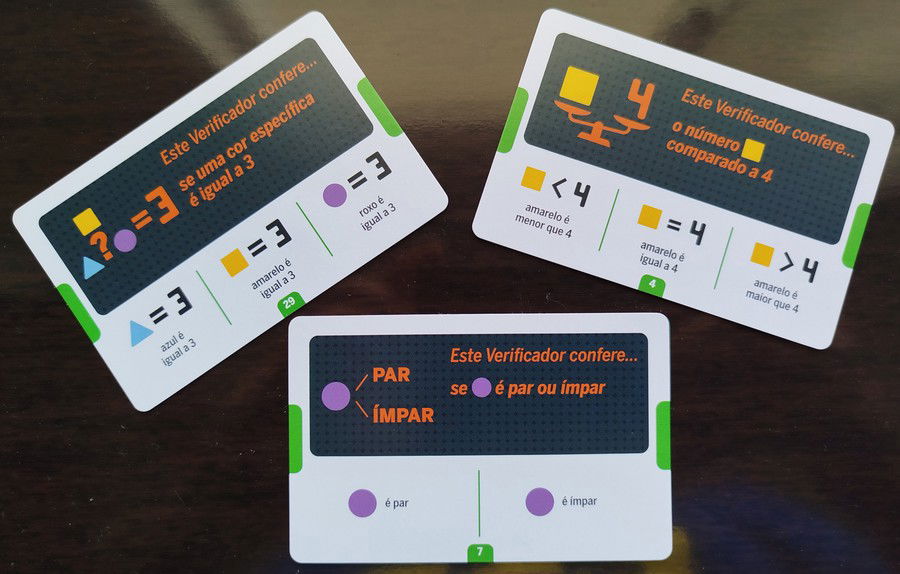
In your turn, you can question the machine up to 3 times - I said "can" because this is important and makes a difference at the end of the game. I'll explain this in more detail further on.
Take notes as precisely as you can because you'll use them for your conclusions and deductions. That's why the game comes with very useful note sheets.
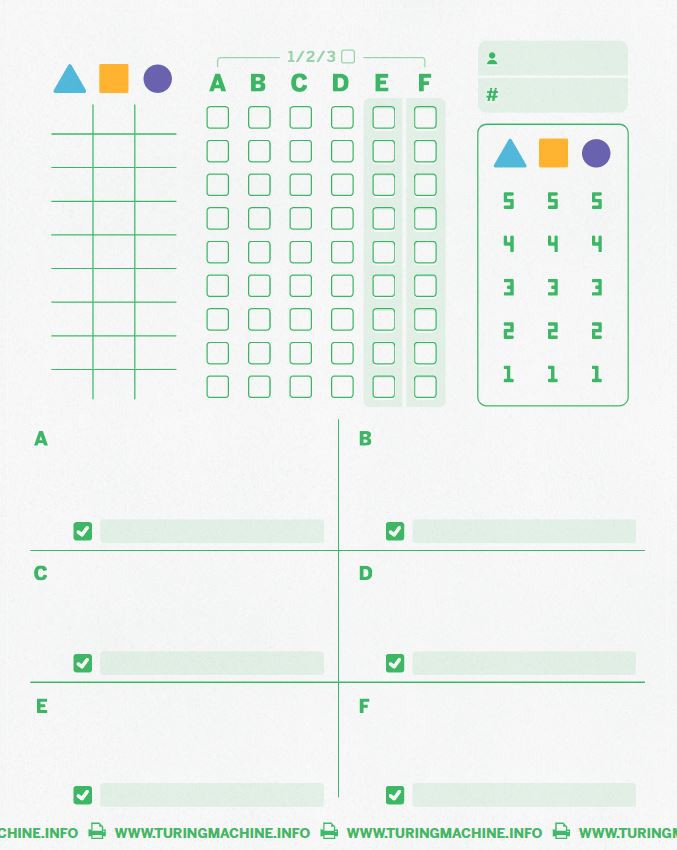
At the end of a round, players may declare whether they cracked the code or not. They all extend their closed fists and count to 3. On 3, you should place your thumbs up (if you cracked the code) or down (if you didn't crack the code yet).
This is a round of Turing Machine!
End of the Game
If one or more players declare they've found the code and put their thumbs up at the end of the round, they should write it down in their Note Sheet in secret. After they do that, each one checks, one at a time, the solution of the code in the rulebook. If one of them gets it right, they win the game, but if they miss, they'll be eliminated and the game goes on.
If more than one person finds out the code at the same time, that is, if they tie, the person who asked less questions to the Turing machine wins. Now you see why I said you "can" question the machine up to 3 times: it makes a difference in the end, as the less you ask, the better.
Strategy Tips
As the Turing Machine relies on your deduction and logic skills, your best bet is to begin using them as soon as the game starts. It's actually pretty simple: if one of the criteria cards checks how many number 1s the code has, obviously that can be one, two, three, or none. Straight away, I'd test 3 numbers that are not 1 because if my proposal fails the test, that means there is at least one number 1 in the code. Bingo! That's the logic behind the game!
Ad
This means you should try to limit how many times you check the same criterion through the machine because then you'll ask less questions, which might untie your results in the end.
Taking notes as precisely as possible is also essential because you'll need to use them to guess the code correctly. Put some time into it, and, trust me, rushing this moment and relying on your memory alone won't help. There are many criteria, so if you don't take notes accurately, you'll have to go back to the machine and check the same criterion again. You'll end up losing time and the opportunity to guess the code early on.
What I mean when I say "deduction skills" is checking your proposals through the criteria, and not by what you "think or guessed" based on your instinct. Trust me, this is a math-based logic board game, so guessing the code "based on nothing" won't work. You have to confirm your guesses through the machine's "scientific" methods.
This is a game that clearly benefits people who have great logic skills, so, honestly, anyone who excels at this field, or easily adapts to it, will have an advantage. This is why I stressed at the beginning of this review that you should put in some time to understand the criteria cards as best as you can; it's so everyone has the same opportunity to guess the code.
Use your deduction skills and have fun with Turing Machine!
Unboxing, Rules, and Gameplay Videos
Enjoy this unboxing:
Check out this video covering the rules:
Check out some gameplay (with rules beforehand, but I timed it for you):
Teaching Moments
"Turing Machine" is a true gift to put your logic and math skills to work, and also greatly encourages you to research, focus on collecting data, and run practical "scientific" tests. If you do all of this as best as you can, you'll get punch cards with the clues you need to guess the results. Let's go!
Mathematical logic is useful for everything in our lives. This game takes this to the extreme, and I confess it feels great when you get it right as you play, as it makes you feel "smarter". However, what we'll actually be using as we play is a skill we all have, though I confess some are more inclined to it than others, particularly those who lean towards STEM, or at least like this field.
I highly recommend playing Turing Machine to encourage your children to work on their logic skills. Start with the easier problems, and encourage your children to use their brain. They'll eventually want more codes, and harder ones too. Do it for them, and they'll thank you in the future!
This game also encourages research, as you need to test your guesses all the time, and that's nothing more than running trials to get to the result you want. It is quite stimulating for children who always want to learn about everything.
As note-taking is essential, whoever takes their time and focuses on accurately writing down test results will be more successful. This shows how important it is to collect data accurately, which is also something we use daily. Turing Machine will teach them how valuable it is to take notes as accurately and clearly as you can - and make sure they don't have to run the same tests again later.
Ad
Tests are also essential as they are the basis of this game, so knowing how to read them is the key to everything. That's when you'll use your focus and logic skills. I highly recommend that, if you're playing with children, you help them through this step without telling them the results. Help them use logic and teach them how to read the answer the machine gives them.
I can say for sure that whoever finds the code and wins the game feels really empowered because this game truly makes you lean on your logic and deduction skills. It is an incredible sensation!
In the end, this game will teach you how to make the most out of your logic and deduction skills!
I highly recommend you add Turing Machine to your collection.









— 评论0
成为第一个发表评论的人